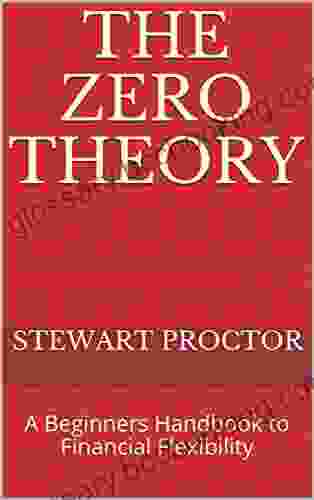Beginners Handbook To Financial Flexibility

Are you tired of feeling trapped by your finances? Do you long for the freedom to live your life on your own terms, without being held back by financial constraints? If so, then this beginners handbook to financial flexibility is for you.
In this guide, you will learn everything you need to know to achieve financial flexibility. We will cover essential topics such as:
5 out of 5
| Language | : | English |
| File size | : | 1202 KB |
| Text-to-Speech | : | Enabled |
| Screen Reader | : | Supported |
| Enhanced typesetting | : | Enabled |
| Word Wise | : | Enabled |
| Print length | : | 7 pages |
| Lending | : | Enabled |
- Budgeting and saving
- Investing
- Debt management
- Retirement planning
- Estate planning
We will also provide you with practical tips and tools that you can use to implement these strategies in your own life.
Chapter 1: Budgeting and Saving
The first step to financial flexibility is to create a budget. A budget will help you track your income and expenses so that you can see where your money is going. Once you know where your money is going, you can start to make changes to save more money.
There are many different ways to create a budget. You can use a spreadsheet, a budgeting app, or even just a piece of paper. The important thing is to find a method that works for you and that you will stick to.
Once you have created a budget, you need to start saving money. Saving money is essential for financial flexibility because it gives you a cushion to fall back on in case of unexpected expenses or emergencies.
There are many different ways to save money. You can set up a savings account, contribute to a retirement account, or even just put cash in a jar. The important thing is to find a way to save money that works for you and that you will stick to.
Chapter 2: Investing
Investing is another important part of financial flexibility. Investing can help you grow your wealth over time, which can give you more options in the future.
There are many different ways to invest. You can invest in stocks, bonds, mutual funds, or real estate. The type of investment that is right for you will depend on your individual circumstances and goals.
If you are new to investing, it is important to do your research and talk to a financial advisor. This will help you make informed decisions about your investments.
Chapter 3: Debt Management
Debt can be a major obstacle to financial flexibility. If you have too much debt, it can be difficult to save money or invest. It can also make it difficult to qualify for loans or other financial products.
There are many different ways to manage debt. You can consolidate your debt, refinance your debt, or even negotiate with your creditors. The best way to manage debt will depend on your individual circumstances.
If you are struggling to manage debt, it is important to seek professional help. A credit counselor can help you create a plan to get out of debt and improve your financial situation.
Chapter 4: Retirement Planning
Retirement planning is an important part of financial flexibility. Retirement planning can help you ensure that you have enough money to live comfortably in retirement.
There are many different ways to save for retirement. You can contribute to a 401(k) plan, an IRA, or a traditional savings account. The type of retirement account that is right for you will depend on your individual circumstances and goals.
If you are not sure how to start saving for retirement, it is important to talk to a financial advisor. A financial advisor can help you create a retirement plan that meets your individual needs.
Chapter 5: Estate Planning
Estate planning is another important part of financial flexibility. Estate planning can help you ensure that your wishes are carried out after you die.
Estate planning can be complex, but it is important to start planning early. By creating a will or a trust, you can ensure that your assets are distributed according to your wishes. You can also name a guardian for your children and make arrangements for your funeral.
If you do not have an estate plan, your state will decide how your assets are distributed after you die. This may not be in accordance with your wishes. By creating an estate plan, you can make sure that your wishes are respected.
Financial flexibility is a key to financial freedom. By following the tips and strategies in this guide, you can achieve financial flexibility and live the life you want to live.
Remember, financial flexibility is not a destination, but a journey. It takes time and effort to achieve financial flexibility, but it is worth it. The sooner you start, the sooner you will reach your financial goals.
5 out of 5
| Language | : | English |
| File size | : | 1202 KB |
| Text-to-Speech | : | Enabled |
| Screen Reader | : | Supported |
| Enhanced typesetting | : | Enabled |
| Word Wise | : | Enabled |
| Print length | : | 7 pages |
| Lending | : | Enabled |
Do you want to contribute by writing guest posts on this blog?
Please contact us and send us a resume of previous articles that you have written.
 Book
Book Novel
Novel Page
Page Chapter
Chapter Text
Text Story
Story Genre
Genre Reader
Reader Library
Library Paperback
Paperback E-book
E-book Magazine
Magazine Newspaper
Newspaper Paragraph
Paragraph Sentence
Sentence Bookmark
Bookmark Shelf
Shelf Glossary
Glossary Bibliography
Bibliography Foreword
Foreword Preface
Preface Synopsis
Synopsis Annotation
Annotation Footnote
Footnote Manuscript
Manuscript Scroll
Scroll Codex
Codex Tome
Tome Bestseller
Bestseller Classics
Classics Library card
Library card Narrative
Narrative Biography
Biography Autobiography
Autobiography Memoir
Memoir Reference
Reference Encyclopedia
Encyclopedia Mark Miodownik
Mark Miodownik Wendy Tones
Wendy Tones Virginia Woolf
Virginia Woolf Rosie Martin
Rosie Martin Judith Mckay
Judith Mckay Jacob Biggle
Jacob Biggle Meg Keys
Meg Keys Laura Lam
Laura Lam Jackson Carter
Jackson Carter James Rosenquist
James Rosenquist Jacob Soll
Jacob Soll T L Christianson
T L Christianson Stacey Darlington
Stacey Darlington Linda Medley
Linda Medley James Greenblatt
James Greenblatt Philip Simmons
Philip Simmons Jamie Purviance
Jamie Purviance Tiffany Bergin
Tiffany Bergin Sucheta Rawal
Sucheta Rawal Jon Paschetto
Jon Paschetto
Light bulbAdvertise smarter! Our strategic ad space ensures maximum exposure. Reserve your spot today!

 Julian PowellHow Lady Gaga Turns Followers into Fanatics: The Secrets to Building a Loyal...
Julian PowellHow Lady Gaga Turns Followers into Fanatics: The Secrets to Building a Loyal...
 Arthur Conan DoyleUnleash the Power of the Emperor: An in-Depth Exploration of "Hammer of the...
Arthur Conan DoyleUnleash the Power of the Emperor: An in-Depth Exploration of "Hammer of the... Beau CarterFollow ·17.2k
Beau CarterFollow ·17.2k Marcel ProustFollow ·7.5k
Marcel ProustFollow ·7.5k Maurice ParkerFollow ·6.8k
Maurice ParkerFollow ·6.8k Milan KunderaFollow ·16.2k
Milan KunderaFollow ·16.2k Eric NelsonFollow ·5.7k
Eric NelsonFollow ·5.7k Amir SimmonsFollow ·5.6k
Amir SimmonsFollow ·5.6k Glen PowellFollow ·12.2k
Glen PowellFollow ·12.2k Justin BellFollow ·10.9k
Justin BellFollow ·10.9k

 Douglas Adams
Douglas AdamsGingerbread Friends by Jan Brett
A Magical Tale for the Holidays Jan Brett's...

 Joseph Foster
Joseph FosterHappy Birthday Moo Moo Family: A Delightful Tale for Kids...
Celebrate the Bonds of Family with...

 Demetrius Carter
Demetrius CarterUncover the Enchanting Tapestry of New Delhi: A Visual...
New Delhi, India's vibrant capital, is a...

 W.B. Yeats
W.B. YeatsUnveiling the Power of Lean UX: A Comprehensive Review of...
In the rapidly evolving world...
5 out of 5
| Language | : | English |
| File size | : | 1202 KB |
| Text-to-Speech | : | Enabled |
| Screen Reader | : | Supported |
| Enhanced typesetting | : | Enabled |
| Word Wise | : | Enabled |
| Print length | : | 7 pages |
| Lending | : | Enabled |












